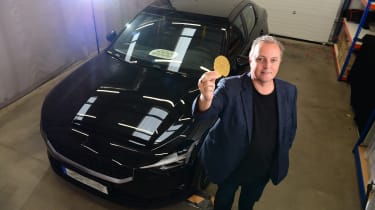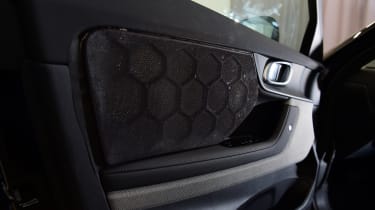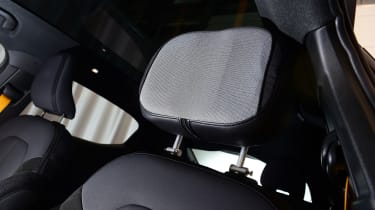British firm is planning to shake up the in-car hi-fi world with its audio panels that replace traditional speakers. We sound them out


When it comes to high-end hi-fi, Britain rules the sound waves. Whether it’s building wonderful woofers or terrific tweeters, the UK’s audio industry is second to none, with a rich legacy of well known brands emanating from these shores.
Much like the car industry, many of these famous names are now under foreign ownership, but the expertise remains in the UK, as does the drive to take audio in new directions.
-
 Car stereo reviews: the best double-DIN head units 2021
Car stereo reviews: the best double-DIN head units 2021
Those woofers and tweeters could well be consigned to history, though, thanks to new tech from a business that was spun out of Warwick University. Warwick Acoustics is firmly fixated on car audio, using an Electro Acoustic system that, it claims, provides sustainability, size, weight and energy benefits, along with a big step up in sound quality.
Auto Express was invited up to the firm’s base at the Motor Industry Research Association (MIRA) technology park in Nuneaton, Warks, to meet the team and get a demonstration of the innovative speaker systems.
In fact, we already had an early taste of the tech, thanks to a pair of the company’s headphones, which acted like a bit of a Trojan Horse for Warwick Acoustics’ system, as CEO Dr Mike Grant explained to us: “We did a prototype headphone system just to prove to ourselves and to our shareholders that the technology could actually be put into a product. The reaction from the headphone guys at the Consumer Electronics Show (CES) was pretty amazing.”
The innovation comes down to replacing the complex and comparatively sizable traditional speaker, which has multiple parts that work to push a cone to produce soundwaves, with a much narrower Electro Acoustic Panel (EAP). The EAP features a wafer-thin membrane centred between two similarly thin electrically conductive stators. By moving an electric charge across the panel, the membrane moves to produce audio waves. While that’s simplifying it greatly, because the moving membrane is so light and slender, it can move at a speed that traditional speakers can’t, to produce what Grant says “delivers benefits in terms of mass, power efficiency and accuracy.
“We’re able to shrink the size of our speaker to about 1.5 times that of a cone speaker and get the same amount of output power,” he explains. “And the transduction efficiency is now up to 33 per cent in comparison with three per cent for a normal moving-coil speaker. “We call it a level-five system. Existing audio brands sell systems between levels one and four.”
The ideal solution for Warwick Acoustics is to be in at the start of a new car’s development to totally integrate the EAPs within the design. But the current crop of panels fits into the same spaces as existing speakers, which – and we’re guessing here – will probably be the case for the first appearance of the technology in a high-end production car.
Beyond that, the panels can be more easily fitted higher up in door panels, across the dashboard, in pillars, roofs and – as we experienced – headrests, where the EAP’s speed of response will help car manufacturers to produce more natural synthesised sounds that react quicker to a driver’s inputs. The panels can even be backlit for added drama or ambience inside the car.
Grant says the set-up is particularly suited to EVs, not only because of the quietness of the powertrain, but the efficiency of the system. “If you’re buying today, you’ll buy a premium audio system, which could be 20 to 30 speakers and will be 1,500 watts to two kilowatts,” he tells us. “We can give you the same experience, if not better, for between 150 and 200 watts. This is the LED light bulb of the audio industry. Basically it’s brighter, it is better, it’s more flexible and it’s a hell of a lot more efficient.”
It also includes a strong sustainability message – EAPs do without the rare earth elements of traditional speakers, while the panels themselves are made from 100 per cent upcycled or recyclable materials.
The proof of the pudding, in this case, is in the listening, and we’re invited to take to the driving seat of a Polestar 2 that has been stripped of its existing audio set-up and fitted with EAPs in the upper door panels, across the dashboard and in the headrests. Alongside us is Warwick Acoustics’ chief technical officer Ben Lisle, who hands us his Apple iPad that controls the system and encourages us to choose some music and turn it up. Loud.
We choose a few go-to audio test tracks, everything from Metallica’s Sad But True, through to Pink Floyd’s Wish You Were Here and 50 Cent’s In Da Club. The result is astounding, revealing elements to the tracks that we simply hadn’t heard before, with a level of depth and detail – and an expansive soundstage – that was, without doubt, the best we’d ever heard in a car.
“This is what the artist wants you to hear,” says Lisle, grinning widely. And we can believe him.
But when will this be available in a car and how much will it cost? Grant is coy on both responses other than to say that the first installation is likely in 2025, while a Warwick Acoustics system will be positioned as the most premium of audio options available with their partner manufacturers.
The good news is that, over time, there is a desire and potential to take the technology to the mass automotive market and, potentially, into our homes, too.
For the time being, though, this is another great British audio success story that’s set to transform the listening experience inside a car.
The British car industry has had its highs and lows but what are the best cars ever built in Britain? Here's our Top 50…
Source: Read Full Article


